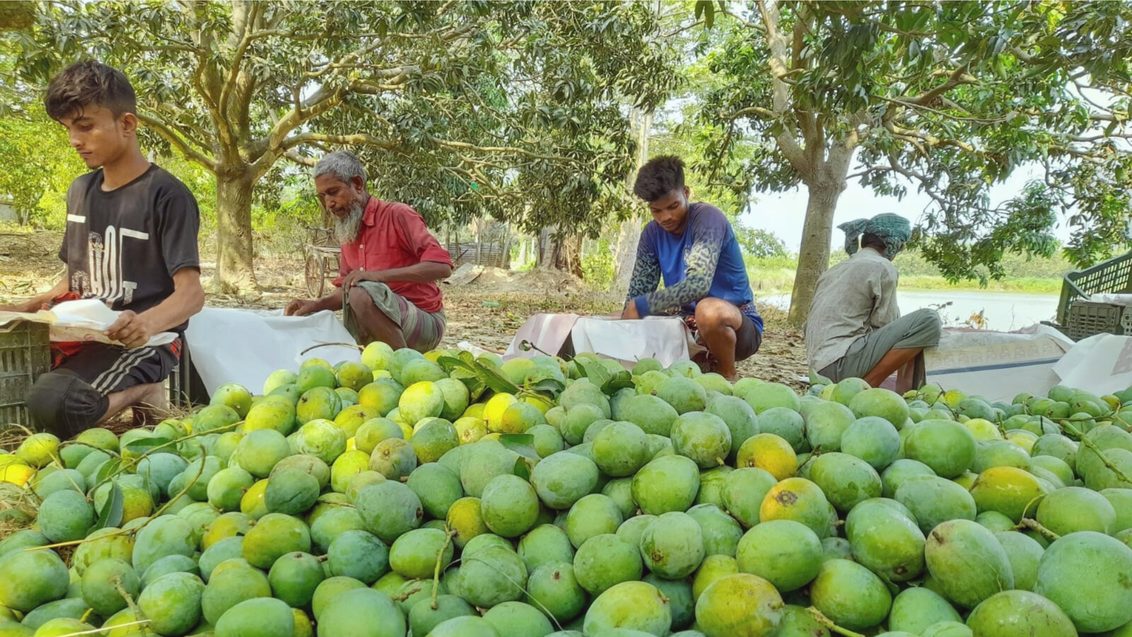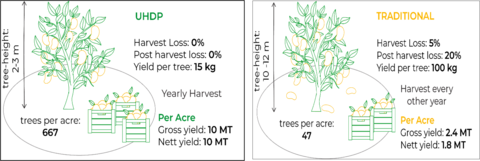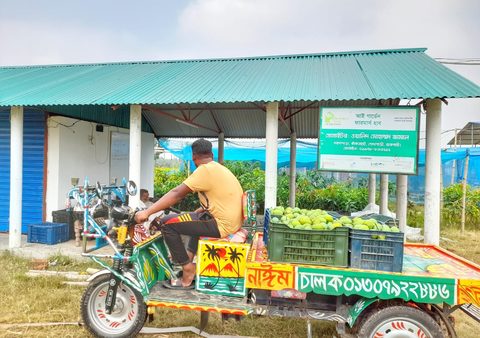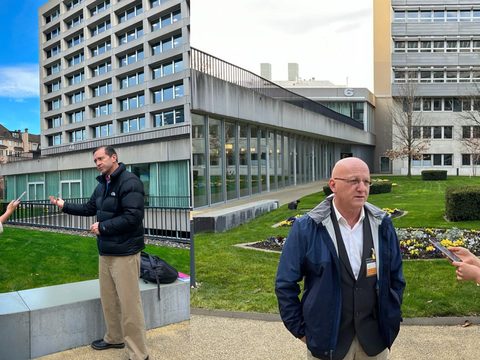IWET Saves Water & Boosts Farmer Incomes

Barind Tract, Bangladesh
Mangoes are very popular in Bangladesh. The country ranks seventh worldwide in production. However, most of the crop sells domestically. The main barrier to exports is poor quality. Bangladesh mango growers typically lack knowledge about chemical residues and about pests and diseases in ripened fruit. They also often over-irrigate, leading to the depletion of groundwater.
In 2018, SFSA Bangladesh began the “IWET” project: Introducing Water-Efficient Technologies. The work focused on mango growers in the Barind Tract area. The main aim was to minimize farmers’ use of groundwater by introducing Ultra High-Density Plantation (UHDP) practices combined with drip irrigation. But IWET also has a strong commercial side: UHDP raises mango quality to export-level.
SFSA Bangladesh provided technical know-how, training on production, post-harvest management and marketing. Our team also linked growers with technology partners to help produce for both export and the premium domestic segment.
UHDP helps farmers to use:
- The right amount of crop protection products at the right time (with support from local government agricultural officers)
- Appropriate fruit bags
- Year-round drip irrigation.
These measures all improve mango quality.
For further details: https://www.syngentafoundation.org/news/recent-news/less-water-more-income-thats-idea
Successes so far
From 2018 to 2022, SFSA Bangladesh ran 120 demonstrations of Ultra-High Density Plantation (UHDP) with drip irrigation technology and high-yielding varieties mango. In 2023, total demo yield on 11 hectares is about 250 MT, more than 22.7 MT per hectare.
Profitability of UHDP with drip irrigation:
- Higher yield: The yield of a mature UHDP is 3-4 times higher than a traditional plantation. A UHDP provides higher yields through a higher number of trees per acre that outweighs the lower yield for each individual tree. Also, the high yielding variety can be harvested every year, whereas the traditional variety only can be harvested every other year. A new UHD- plantation provides its first harvest after 18 months.
- Reduced harvest and post-harvest loss: UHDP with man height (3 meter) trees minimises harvesting losses. In contrast, in a traditional orchard, harvest and post - harvest losses are about 25% due to mangos that drop during the picking process and less efficient pesticide application due to the higher tree height.
By 2023, seeing the good results along the way, 1415 farmers trained by the IWET project had set up UHD mango gardens. They were joined by 442 growers from outside the project. Together, these smallholders are now growing the fruit on about 810 hectares. In 2023, they are expected to produce more than 16,000 MT, with yields close to 19 tons per hectare. The key buyers are Farmers’ Hubs, the local agri-service businesses established with the help of SFSA Bangladesh.
These Hubs have already helped the growers score success abroad: In 2022, one of them supplied 500 kg of mango to a Turkish supermarket chain, trading via a major export company. It was the first of its kind to supply Bangladeshi mango to the Turkish market. This year, the same exporter has sold 1000 kg of another Hub’s premium mango to Dubai. Further buyers include well-known national store chains such as Unimart, Astha Super Shop, Fargo Mart and GamePlay. Farmers’ Hubs also aggregate large volumes for mango pulp producers such as Pran and Shezan.
After three years of planting mango saplings, farmers are harvesting mangoes from their UHD mango orchard. The SFSA Bangladesh IWET project team is working on linkage development with institutional buyers, and as a result, farmers are getting higher prices from the local market. The Nearest Farmers’ Hub is aggregating premium-quality mango for institutional buyers and exporters. Mango orchard owners are lighted to sell to the Farmers’ Hub because:
- getting a higher price than the local market due to premium quality (3-5 BDT more per Kg).
- Selling toll-free (in the local market must pay toll to leaser) (Save 10 BDT per 40 kg)
- Comparatively, transportation costs are lower to the nearest Farmers’ Hub than the local market.) (Save around 20 BDT per 40 kg)
For export market outreach expansion, uniformity of produced mango is critical which can be ensured through controlled irrigation, correct dosage of fertilizer and pesticide management as well as intensification of production to ensure commercial level production. Mango orchard farmers are capacitated with training on Ultra-High Density
On the climate side, due to drip irrigation practices, the farmers save 65% of groundwater extraction for irrigation as water scarcity is the prime concern for the Barind tract. This Barind Track area supper 30% less rainfall than the annual country average rainfall (2200mm). Additionally, enhancing agroforestry through new grading helps in sequestering CO2 and improving bio-diversity. It also contributes to reducing land utilization and enhances land usages efficiency for its density plantation.
The Barind Tract, covering 1600 km² in the northwest region of Rajshahi Division, is facing exclusive challenges that demand urgent attention (BDP 2100). About 42% of the high Barind area experiences ground water scarcity during dry seasons, directly hampering food security as land remains fallow or underutilized. The region's unique proposition as a mango hub is losing out on modernization opportunities and export markets. To address these challenges, climate-smart technologies are needed to create resilience, mitigate water scarcity, enhance farm productivity and engage rural women and youth in sustainable farming practices.
Drip irrigation in Ultra high density method saves water upto 65%.
Looking into the future…
More trainings on premium quality mango production for export market and available source of mango export are required then farmers will be benefited. Also, drip irrigation requires high initial investment as well as regular capital involvement for replacement of its equipment. Therefore, alternative cost friendly solutions can also be researched and implemented.
In the old days, we simply couldn’t imagine that our mango would get into the export market. UHDP changed the way we farm. In future, with technical training and info from SFSA Bangladesh, we can produce even more premium-quality mango for export and the domestic market. That will bring big benefits for our local farmers.
Bani Israil, Farmer
Farmers’ Hubs sales highlights
By July 2023, a total of 30 Farmers’ Hubs had bought mangos from IWET and non-IWET farmers and sold them to lucrative customers. Here are some examples:
*52 tons to direct customers.
*42 tons to pulp processors.
*80 tons to city wholesale markets.
*1.5 tons to the export market
*6.5 tons to super shops in Dhaka.
Mango numbers
According to Department of Agriculture Extension in Chapainawabganj, there are 37,588 hectares of mango orchards and the government has set a target to produce 440,956 tons of mango just in 2023.
Source: https://www.dhakatribune.com/nation/2023/05/18/bumper-mango-production-…
____________________
The IWET Project is implemented by SFSA Bangladesh and DASCOH Foundation with the coordination support of 2030 WRG. Funded by The Coca-Cola Foundation
CONTACTS for further info:
Abdur Rouf
Program Development Lead
Mail: Abdur.Rouf@syngenta.com



